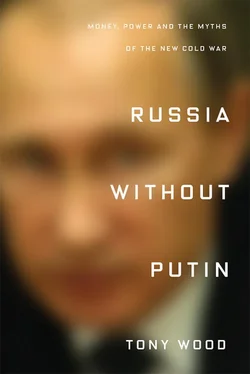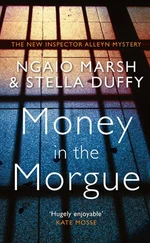The other was a deep suspicion of Russia among Western policy-making elites, dating back through the Cold War all the way to 1917. The Bolshevik Revolution had created a breach in the international state system, a hole in the map that no amount of diplomacy or détente had been able to close. The fall of Communism, although it brought down the capitalist West’s systemic rival, didn’t fully close it either – leaving in place a fundamental mistrust of Moscow in Washington and other Western capitals. (This might be termed a ‘White legacy’, in contrast to the ‘Red bequests’ discussed earlier.) As long as Yeltsin was in power and willing to fall in with Western thinking, these doubts could be assuaged. But the moment things changed, the older ideological reflex would kick in once more, fuelling criticisms of Russia that the West never levelled at far more repressive regimes whose interests were more compatible with Western aims, such as those in Saudi Arabia or Egypt, say. NATO expansion was therefore to some extent an insurance policy against an outcome that, ironically, the expansion would ultimately help to create: the return to the world stage of an independent Russia, with interests distinct from those of the West.
In the early 1990s, though, such a prospect remained distant. The immediate strategic gains from NATO expansion were clear enough that a bipartisan consensus soon developed around the policy in the US. However, the Clinton administration also knew that too rapid an expansion would torpedo Yeltsin’s chances of re-election, so from 1993 to 1996 it pursued a two-track policy, offering Russia and other Eastern European states membership in a ‘Partnership for Peace’ that seemed to be an alternative to an expanded NATO. (Yeltsin was certainly taken in by the ruse: ‘This is a brilliant idea, it is a stroke of genius!’ he exclaimed to US secretary of state Warren Christopher, adding: ‘Tell Bill I am thrilled.’) {22} 22 See Svetlana Savranskaya and Tom Blanton, ‘NATO Expansion: What Yeltsin Heard’, National Security Archive Briefing Book , No. 621, 16 March 2018, and the accompanying Document 08, ‘Secretary Christopher’s meeting with President Yeltsin, 10/22/93, Moscow’.
Meanwhile the US prepared the ground for a first round of NATO enlargement – starting in 1994 with the NATO Enlargement Facilitation Act, designed to smooth the path of Poland, Hungary and the Czech Republic to join the alliance.
This dual-track approach struck hard-line Cold Warriors as needless pandering to the Russians; Henry Kissinger apparently asked, ‘Whoever heard of a military alliance begging with a weakened adversary?’ {23} 23 Quoted in Goldgeier, Not Whether But When , p. 113.
But it was in any case abandoned soon enough. Once Yeltsin was safely re-installed in the Kremlin, in the summer of 1996 – in no small measure thanks to covert assistance from the West {24} 24 See Sean Guillory, ‘Dermokratiya, USA’, Jacobin , 13 March 2017.
– the US could be more blunt. Clinton’s deputy secretary of state (and former college roommate), Strobe Talbott, told Anatoly Chubais, chief of Yeltsin’s presidential administration, ‘that NATO enlargement was going to happen, and… that Russia had to make sure that it did not look like Moscow had lost’. {25} 25 Goldgeier, Not Whether But When , p. 112.
In March 1999, when Hungary, the Czech Republic and Poland formally joined the alliance, NATO immediately moved ahead with a second wave of expansion, establishing ‘Membership Action Plans’ for nine more countries, including the three Baltic states. Both of these developments took place at the height of the NATO intervention in Kosovo – conducted without UN Security Council authorization, since it was evident that Russia would veto it – underscoring still more deeply Russia’s irrelevance on the world stage. Primakov, then prime minister, was on his way to Washington when the bombing of Yugoslavia started, and ordered his plane to turn around in protest. It was a forceful symbolic gesture – but then, Russia’s means were too limited to do much else.
Washington’s ability to impose its will on the question of NATO enlargement, whatever Moscow’s objections, made plain the fundamental imbalance in power between the two countries. Hard enough in itself for Russia to accept, it was made still worse by the manner in which US diplomats wielded their authority. As early as 1993, Kozyrev – who could scarcely be accused of hostility to the West – was protesting to Talbott, ‘It’s bad enough having you people tell us what you’re going to do whether we like it or not. Don’t add insult to injury by also telling us that it’s in our interests to obey your orders.’ Talbott’s assistant at the time, Victoria Nuland – who later became infamous for her role, captured in an intercepted phone call, in choosing Ukraine’s post-Maidan government – apparently observed that this was ‘what happens when you try to get the Russians to eat their spinach’. {26} 26 Strobe Talbott, The Russia Hand: A Memoir of Presidential Diplomacy , New York 2002, p. 76. For a fascinating portrait of successive generations of US Russia policy experts, see Keith Gessen, ‘The Quiet Americans Behind the US–Russia Imbroglio’, New York Times Magazine , 8 May 2018.
The condescension behind such words – the infantilization of what was, after all, a state with almost half the world’s nuclear weapons – would have been only too apparent to Washington’s Russian interlocutors.
The drive for NATO expansion also made it clear that there was no room for Russia within European institutions or Euro-Atlantic security arrangements. The Yeltsin government several times floated the idea of joining NATO, but Russian membership was never seriously considered. Despite its weakness in the 1990s, Russia was still too large and powerful a state to be easily fitted into the system as it was. According to Brzezinski, ‘the politically decisive fact is that Russia bulks too large, is too backward currently and too powerful potentially to be assimilated as simply yet another member of the European Union or NATO. It would dilute the Western character of the European community and the American preponderance within the alliance.’ {27} 27 Brzezinski, ‘Normandy Evasion’.
As part of NATO or an expanded EU, for example, it would have been on a par with Germany or France in terms of its decision-making influence, capable of banding together with either to block US designs.
The whole course of US policy toward Europe in that decade was precisely geared to averting such a scenario. The ‘Partnership for Peace’, the Permanent Joint Council set up in 1997, and the NATO–Russia Council that replaced the PJC in 2002 may have seemed to provide avenues for co-operation between Moscow and the West. But as the Russians quickly realized, these were substitutes for membership rather than stepping-stones to it. When Putin, installed as president just weeks earlier, asked Clinton at a June 2000 summit how he would respond to Russia’s joining NATO, Clinton apparently looked desperately at the advisers flanking him: Secretary of State Madeleine Albright, who ‘pretended that she was looking at a fly on the wall’, and National Security Adviser Sandy Berger, who ‘did not react at all’. Clinton was reduced to saying he would ‘personally’ – a word he repeated three times, to be on the safe side – support it. {28} 28 Peter Conradi, Who Lost Russia? How the World Entered a New Cold War , London 2017, p. 123.
But since he would be leaving office a few months later, this assurance was not worth much.
The process of NATO enlargement is crucial to understanding why and how relations between Russia and the West later deteriorated. It demonstrated the basic imbalance that has governed strategic calculations on both sides ever since: the US enjoyed accumulated advantages that enabled it either to attend to or ignore Russian interests as it pleased, while Russia retained enough of its great-power habits of mind to resent this state of affairs, but lacked the capacity fundamentally to alter it. Yet although this resentment increased over the next decade, the underlying thrust of Russian policy remained broadly oriented toward the West. This contradictory dynamic, in which Russia’s aspiration to join the West mingled with rejection of it, underpinned the mounting confrontations between the Kremlin and Western governments from the mid-2000s onward.
Читать дальше












